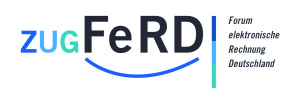
Send us an e-mail to info@stahlcon.de with your preferred recipient address for receiving the invoice by e-mail. You will then always receive one invoice per e-mail from us. There will be no collective mailing.
Here is some more information on this topic:
How do I have to archive an electronic invoice?
Electronic invoices must be stored in the format in which they were received. For example, if you receive an invoice as a PDF file, this PDF file must be stored. If you receive the invoice as text in an e-mail, you must store the e-mail with the invoice text.
The storage of electronic invoices must comply with the principles of orderly accounting (GOB), the principles of orderly IT-supported accounting systems (GOBS) and the principles of data access and verifiability of digital documents (GDPdU).
The retention period is ten years. Electronic invoices must be stored in electronic form in such a way that they cannot be changed during the ten-year storage period and can be made readable at any time.
If you have received an electronic invoice in a structured and machine-readable form, e.g. as an EDI or ZUGFeRD XML file, you must ensure that the invoices also remain machine-readable during the ten-year retention period. If, for example, you convert a received EDI file into an image or PDF file and then destroy the EDI file, this is not permissible from a tax law perspective.
Storing an electronic invoice as a paper printout is not permissible.
If you have more questions about archiving electronic invoices, tax consultants and specialised DMS, ECM and IT consultancies will be happy to help.
What are the advantages of sending invoices electronically?
Invoices in electronic form can replace paper-based processes. This applies not only to sending but also to forwarding within the company or archiving.
An invoice that you receive in electronic form must also be archived in electronic form. Paper filing is no longer necessary and with it shelves full of files.
Forwarding is also simplified. Whereas paper invoices often had to be transported via the post office to the accounting department, electronic invoices can be sent digitally directly to the responsible recipient. This speeds up delivery and reduces processing times. The receipt of discounts or compliance with other payment deadlines can be ensured.
(Copyright FeRD)